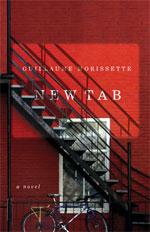
For days after finishing New Tab by Guillaume Morissette, I kept thinking Thomas’ friend Shannon might pop up on Facebook chat. That’s how disarmingly, perhaps unwittingly, authentic the characters are in this book. That authenticity is especially surprising given that Thomas, Shannon and their shifting circle of roommates, workmates, classmates and various acquaintances are often just disembodied virtual entities, to each other and to the reader.
Morissette’s quietly witty novel is set in up to the moment Montreal and traces a year in the life of 27-year-old (well, somewhat inexplicably 26 to his ostensible friends and colleagues) Thomas, a disaffected video game designer looking languidly and yearningly, but not without an undercurrent of genuine determination, to change career and personal directions. Against a blurred-around-the-edges backdrop of dodgy accommodations, fleeting and vague relationships, substance over-consumption (it’d be harsh to call it abuse because it seems so tinged with a kind of innocence), Thomas makes his way. The reader peeks over Thomas’ shoulder at email and Facebook chat clues as to how he progresses, professionally and emotionally.
Thomas’ wit is wistful but rich and constant – a defense mechanism for a psyche both gently bewildered and perhaps singed around the edges from too much time spent online, and an ongoing, rueful delight for the reader, with gems such as:
“My approach with women was like stacking blocks really high in Tetris while waiting for a straight line that might never come.”
“It felt like I was trying to use social networks as a way to prototype myself.”
“Staring at my computer screen, I suddenly wanted to fold my Facebook into an origami crane.”
Morissette keeps the structure of New Tab loose, balancing Thomas’ frequently distracted state of mind while not creating a haphazard or unsatisfactory reading experience. The novel charmingly mixes the epistolary with instances where characters do reach across the static to try to connect, however awkwardly and tentatively. As much as the prevalence of digital communication (or miscommunication) seems to position New Tab as a kind of Virtual Reality Bites, in other respects, the form of correspondence is perhaps irrelevant – just that Thomas and his cohorts are corresponding and trying to communicate is key. In fact, New Tab and the likes of Pride and Prejudice share some literary kinship.
Finally, Thomas stumbles upon a connection between his current vocation and his aspirations:
The more I thought about it, the more I felt like video games and poems had a lot in common. They both tended to take themselves seriously, without caring whether or not the player or reader would be accepting them on those terms. In the story mode of any given Call of Duty, part of the pleasure, for me, came from making fun of the game as I played it, for taking itself so seriously. I sometimes experienced a similar kind of disconnect when reading poems, between the emotional landscape of the poem and my emotional landscape while reading it.
Video games were also often about the player achieving salvation, while poems were often about the speaker achieving salvation.
In the suddenly cinematic last few pages of New Tab, Thomas is propelled into the rest of his life. It feels like the Tetris blocks are falling swiftly and neatly. He is poised to open perhaps the most important new tab of all. The expectations might be downplayed, but you wish him well and kind of hope he pops up on chat or sends you an event invitation for his next poetry reading or book launch sometime in future.
An added delight of New Tab is another arresting book cover by David Drummond (the cover of Marina Endicott’s Good to a Fault is a favourite). The cover of New Tab creates a wonderful sense of physical setting, with slanted transitional light, which could be early morning, or could be early evening, connoting the changes with which Thomas is contending.
See also:
-
Review of epistolary novel Burley Cross Postbox Theft by Nicola Barker
-
Jane Austen and the importance of letters and other written correspondence in Sense and Sensibility, Pride and Prejudice, etc.
Thank you to Véhicule Press for providing a review copy of New Tab by Guillaume Morisette.

